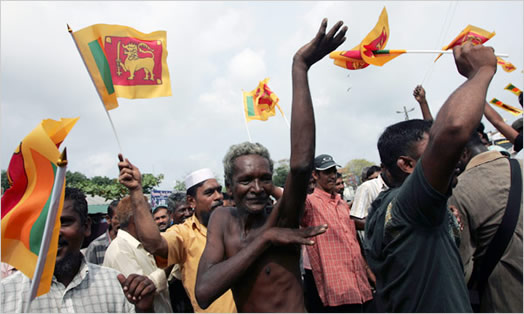Ilankai Tamil Sangam30th Year on the Web Association of Tamils of Sri Lanka in the USA |
||||
 Home Home Archives Archives |
Rebels Routed in Sri Lanka After 25 Years of Warby Somini Sengupta & Seth Mydans, The New York Times, May 18, 2009
The ethnic Tamil separatist rebels of Sri Lanka, one of the world’s most feared and enduring guerrilla movements, acknowledged Sunday that their war of more than a quarter-century for a homeland had “reached its bitter end.” The announcement by their group, the Liberation Tigers of Tamil Eelam, coming as the Sri Lankan military said it was conducting final mop-up operations on a tiny sliver of coast that had been the rebels’ last refuge, paves the way for the conclusion of Asia’s longest-running civil war. It does not, however, eliminate the possibility of guerrilla strikes. The L.T.T.E., as the rebels are often called, are known for suicide bombings. And the statement by their spokesman, Selvarasa Pathmanathan, posted on the pro-rebel Web site, TamilNet, pointed to the group’s “fearless and unending commitment to this cause.” "This battle has reached its bitter end," Mr. Pathmanathan said. "We have decided to silence our guns." The statement made no mention of surrender and did not concede defeat, but the acknowledgment of finality suggested that the rebels knew the war was over. Assertions about fighting and casualties in the Sri Lanka war cannot be verified because the government severely restricts access by independent journalists. Several, including two from The New York Times, have been prohibited from entering the country, and one who flew late Sunday to Colombo, the capital, was ordered to leave on a return flight.
The Sri Lankan president, Mahinda Rajapaksa, declared victory over his foes even before his military announced the end of fighting, saying the rebels had been “finally defeated.” Speaking in Jordan on Saturday, he said: “I will be going back to a country that has been totally freed from the barbaric acts of the L.T.T.E.” He is expected to make a formal announcement to Parliament on Tuesday. The government said Sunday that all civilians had escaped from the war zone. The Tamil Tigers said 3,000 had been killed in the preceding 24 hours, compelling the rebels to halt fighting. There is no doubt that Mr. Rajapaksa’s government appears poised to achieve what none of his predecessors managed in 25 years: to rout the Tamil Tigers, who controlled nearly a fourth of the island, and destroy their ranks as a conventional army. As the war’s climax approached, both sides had rebuffed repeated calls from the United Nations and several foreign countries to spare civilians caught in the war zone. The United Nations estimates that at least 7,000 have died since January. The government has been pressed to stop shelling known civilian sites, including hospitals. The rebels have been accused of holding their own people hostage. No amount of international pressure has worked, not even appeals from Sri Lanka’s powerful neighbor, India, where Tamil refugees have trickled in, via flimsy fishing boats. It was unclear whether the leaders of the rebellion, including its elusive founder, Vellupillai Prabhakaran, were still trapped in rebel territory, had fled or had bitten into the cyanide tablets they carry around their necks in case of capture. On Monday, according to The Associated Press, the military said that government troops had found the bodies of four senior rebels, including of Mr. Prabhakaran’s eldest son, Charles Anthony, who was said to be the head of the rebels’ air wing. The other bodies, the military said, were of the rebels’ political wing leader, the head of their peace secretariat and one of their top military leaders. Even if the Tamil Tigers have been effectively neutralized, the government will still face the challenge of engaging in serious negotiations on power-sharing with the island’s Tamil minority. Since early this year, the remnants of the rebel force have been cornered in a tiny enclave on the coastline, and human rights groups say both sides have fought with a disregard for large-scale casualties among civilians trapped there. The rebels once ran their own police force and court system, collected taxes and erected monuments to fallen fighters. A 2002 cease-fire held out promise of a negotiated settlement, but the Tamil Tigers dragged out the talks, and almost immediately after Mr. Rajapaksa’s election three years ago, they began provoking his government by ambushing the military. Their suicide bombers unsuccessfully attacked the army chief, Lt. Gen. Sarath Fonseka, and then Gotabaya Rajapaksa, the president’s brother, an American citizen who serves as the powerful secretary of defense. With generous financial support from a Tamil diaspora, the rebels fielded a conventional army with artillery units, a tiny air force and a sizable navy that, according to the Sri Lanka military, even included homemade submarines. The Tigers were weakened by several factors: a global war on terror that pinched its ability to raise money overseas; a split in their ranks; and what, in hindsight, seem to have been devastating strategic errors on Mr. Prabhakaran’s part, including helping to lift Mahinda Rajapaksa to an election victory. Mr. Prabhakaran had urged Tamils to boycott the elections three years ago, effectively vaulting Mr. Rajapaksa, who was backed by ethnic Sinhalese nationalists and whose campaign pledge was to end the war, to power. By that time, a large and important faction of the Tamil Tigers had seceded. It promptly joined the government in pushing Mr. Prabhakaran’s forces from the island’s east. All the while, the Rajapaksa administration managed to amass better weapons, corral political support to quash the Tamil Tigers, crush dissent, and dismiss any international criticism of human rights as pro-rebel propaganda. Last year, after repeated failures, the military broke through rebel lines and began an offensive that drove the rebels from areas in the north that they had controlled for decades. Somini Sengupta reported from New Delhi, and Seth Mydans from Bangkok. |
|||
|
||||
